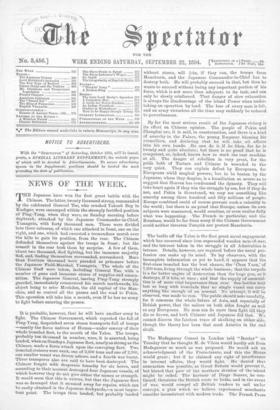By far the most serious result of the Japanese victory
is its effect on Chinese opinion. The people of Pekin and Shanghai are, it is said, in consternation, and there is a kind of anarchy in the Palace, the young Emperor blaming his councillors, and declaring that be will take all affairs into his own hands. He can do it if he likes, for he is twenty and quite absolute; but there is no proof that he is competent, or, indeed, knows how to work the vast machine at all. The danger of rebellion is very great, for the pride both of Tartars and Chinese is wounded to the very quick. They can explain defeat by Europeans, for Europeans wield magical powers; but to be beaten by the Japanese, whom they despise, is a humiliation so severe as to suggest that Heaven has condemned the dynasty. They will take heart again if they win the struggle by sea, but if they do not, and Pekin is threatened, we may see something like anarchy among throe hundred and fifty millions of people. Europe combined could of course prevent such a calamity to the world ; but there is no proof that Europe, unless its own subjects were massacred, would combine, or even realise fully what was happening. The French in particular, and the Russians, would be far from sorry if the Chinese Government could neither threaten Tonquin nor protect Manchuria.


































